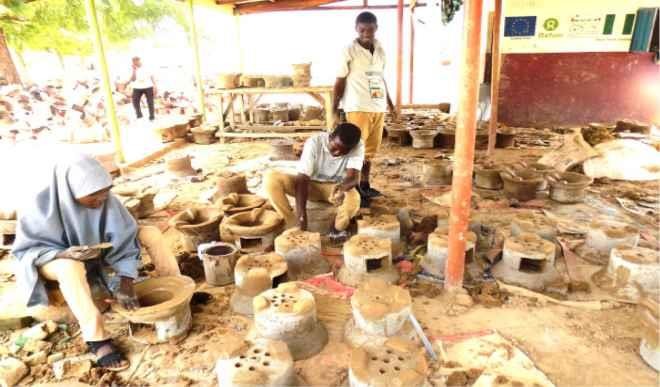
Katsina State in northwest Nigeria is one of the areas threatened by severe desert encroachment. The situation is compounded by citizens of the Sahelian state’s reliance on fuel wood for cooking resulting in many trees being felled annually.
The International Centre for Energy, Environment and Development (ICEED) intervened in 2014 with a project, Improving the fuel-wood balance (FuWoBa) in seven LGAs in the state. The programme has to do with designing and distributing clay-based clean cook stoves across the local governments to improve the environment, save trees and and improve the health of the people.
Daily Trust assesses the project’s impact after visiting the sites and training centres in the state recently.
FuWoBa is an European Union part-funded project under the Energising Access to Sustainable Energy (EASE) programme being implemented by ICEED and Oxfam, two non-governmental organizations (NGOs) in Nigeria.
While Oxfam is implementing the planting of 5.5 million trees across the target areas to battle desertification, ICEED is to improve the fuel-wood balance and resilience of livelihoods of rural households in Mashi, Mai-Adua, Dutsi, Daura, Sandamu, Zango and Baure LGAs of the state with the distribution of clay cook stoves that use sticks and millet husks as fuel rather than tree trunks.
The project is expected to produce significant results in promoting climate change, afforestation, and clean means of cooking to improve the economy and health of the cook stove users.
A total of 35,000 clean clay cook stoves is expected to have been installed through a local supply value chain that involves training and empowering youth and men on the production in the areas, and creating entrepreneurial platforms for retail of the cook stoves beyond the target sites at the end of the programme.
A visit across the seven LGAs with first-hand assessment by our reporters revealed that while the EU set a target of 15 per cent reduction in rural fuel wood consumption, the users data show that about 65 per cent in fuel wood consumption has been attained.
Most of the users who are in the poor and middle income household classes said it is significantly reducing part of their 90 per cent income spent on cooking energy.
The Project Advisor, Farmer Managed Renewable Energy (FMR) Production, Mr Adedamola Ogunsesan, said they are to produce stoves that are affordable and would reduce the use of firewood.
“So far, we have gotten a durable stove that has capacity to reduce firewood consumption by 65 per cent. This translates into saving trees, because the less firewood used the less trees cut down and that helps to end desertification,” he said.
Ogunsesan explained that the tier two clay-based clean cook stove is capable of reducing smoke to the barest minimum using little sticks of wood, adding that there is also the empowerment aspect, financial literacy, gender aspect and working with the micro finance banks.
“Each of our stoves”, according to him, “is being prepared to attract carbon credit in the end and to create a level of efficiency in climate change.”
Ogunsesan said: “The European Union gave us a target of 15 per cent fuel wood reduction and we have gotten to 65 per cent which shows the seriousness. We have achieved that in two years, we are finishing the third year and entering a new one this September.”
ICEED said it deviated from the usual NGOs style of distributing innovative supplies freely, saying, “Our stoves are market driven. If it is free, we would have finished the distribution by now but we discovered that if it is free, the project dies naturally.”
“What we have done is to build a value chain that brings in people that provide clay suppliers, potters, saw dust metal skirts, MFBs, local government officials and artisans. We have been able to track N10 million in that value chain from the stoves supplied so far.”
On the market process, the officials explained that the stove costs about $3 which is about N1,500.
However, at that rate, some of the households interviewed in Mashi, Daura and Dutsi LGAs said they still can’t afford it.
Responding, Mr Ogunsesan said it is true many people still cannot afford it in the project areas, hence they subsidised it to N500, but still there are people who still cannot afford it.
“It is a bit challenging, but the market-based approach is very good at sustaining NGO interventions for projects to last beyond their target time.”
At an average of N1,500 per stove for 35,000 units, about N105 million is expected to be generated within the value chain but has been largely subsidised to drive acceptability and usage. Each of those stoves also have the potential of saving three to four trees annually. For 35,000 stoves, we are expecting to save 140,000 trees at the end. We are not planting trees but we are saving them to be available for other things and to battle desertification, Ogunsesan said.
The Managing Director, Bayajidda MFB, Daura, Malam Abdulwaris Abdullahi, told Daily Trust that the MFB maintains a robust relationship with ICEED in promoting the stoves along with local influencers and opinion leaders.
They gave about 4,000 stoves and about half of that have been sold out, Malam Abdullahi said.
The Programme Officer, Mr Haruna Abubakar, leads the training and technical aspects of the clean clay stoves component.
In an interview, he said: “We trained and equipped 150 persons with the tools initially and another 200 persons, which is a total of 350 potters. There are other artisans like the painters and the metal skirt moulders trained in the process.
A visit to these centres showed men and boys, involved in the 13 kilogramme stove production process. One of the trainees at the Katsina SDC, Mr Benjamin John, while demonstrating the process said it involves mixing clay with sawdust, moulding the stove and firing it in an earthen oven for a day.
The mould is then inserted into the metal pot rest (skirt), painted, beautified and is ready for use.
He has found an income earning means and advised other youth to go for the craft.
“There is a huge project for this production and the youth can gain employment with this and make cool cash for themselves too,” John said.
It was gathered that the overall health benefits of the stove are also to eradicate the exposure to open fire during cooking for mother and child, reducing household expenses on fuel-wood, preventing pollution-based infections and diseases and saving trees, a greater action on climate change driven globally.
A woman who uses the stove to sell cooked maize in Katsina town said, I have enjoyed the stove. For instance, a fuel wood bundle of N50 needed for a day’s meal could be used for three days with the stove, which means N100 is saved.
Speaking further on why Nigerians must key into the energy efficient drive to promote afforestation and improved household income, ICEEDs Communications Officer, Mr Ajibade Adewale, said the project moved faster in third year as a lasting design has been tested.
“We are optimistic that by the end of the project, we will surpass our target. We hope that Nigeria can see the success of this Katsina pilot project and replicate it in other places across the country.
“The EU and Global Alliance have opened our eyes with this innovation, it is left for Nigerians to replicate it across places,” Adewale said.

 Join Daily Trust WhatsApp Community For Quick Access To News and Happenings Around You.
Join Daily Trust WhatsApp Community For Quick Access To News and Happenings Around You.


